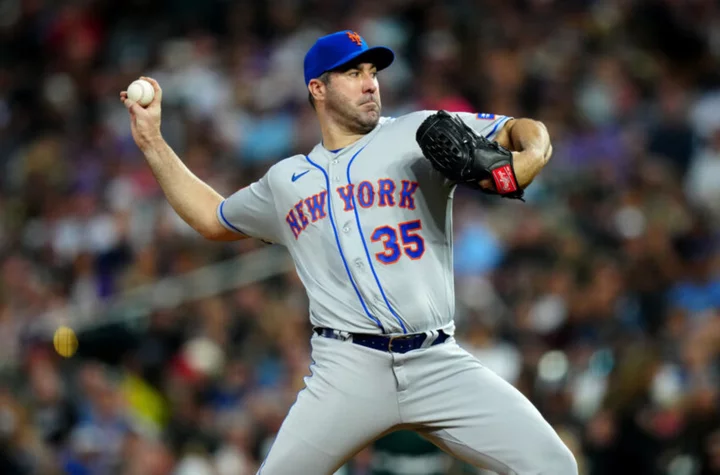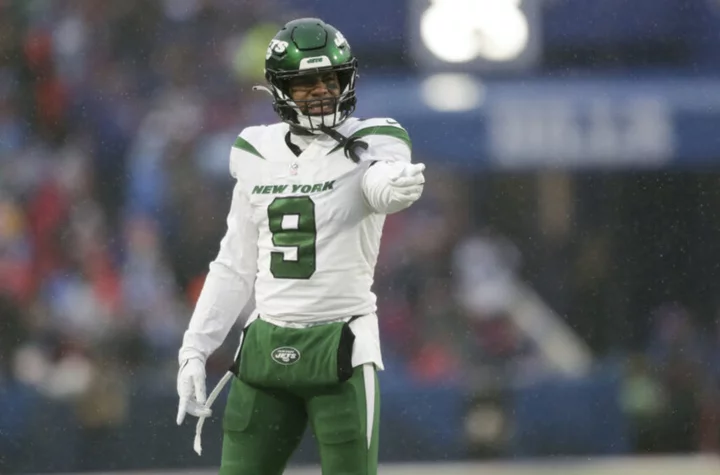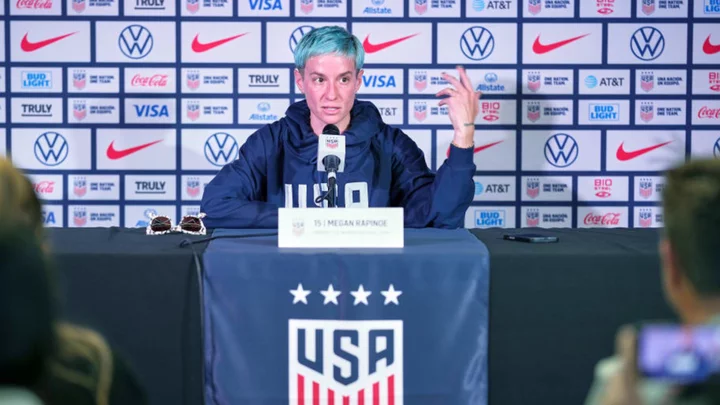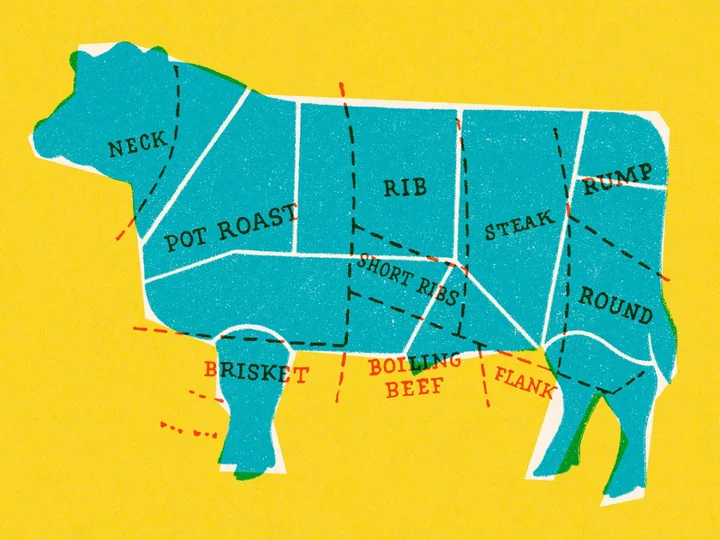
NFL rumors: 3 teams that should go all-in on Jonathan Taylor trade, 1 wild card to watch
Jonathan Taylor formally requested a trade from the Colts on Saturday, and these three teams should go all-in on a trade, with one wild card looming.The writing was on the wall for Indianapolis Colts running back Jonathan Taylor, without question, but he made it official on Saturday. After he an...
2023-07-30 23:54

Justin Verlander trade: 4 teams that could trade for Mets star ranked least to most likely
Justin Verlander is almost certainly going to be an outgoing piece before the MLB trade deadline on Tuesday. These three teams make the most sense.Max Scherzer hinted at a trade, and not even 24 hours later, he was gone. The New York Mets have made it clear after trading Scherzer and David Rober...
2023-07-30 23:21

Italy minister says decision to join flagship Chinese scheme 'wicked'
Italy's defense minister called his country's decision to join a flagship Chinese infrastructure scheme "wicked," as the government weighs up whether continue as part of the scheme.
2023-07-30 22:57

Steelers continue betting on defense with latest vet addition
The Pittsburgh Steelers have featured its share of standout defenses. General manager Omar Khan is adding another veteran piece to this 2023 edition.It’s been an offseason unlike any other for the franchise that has kept its head above water in recent years but has been overwhelmed come pl...
2023-07-30 22:19

Explosion at Thailand fireworks warehouse kills at least 12 people
At least 12 people were killed and 121 injured in an explosion at a fireworks warehouse in southern Thailand.
2023-07-30 19:59

Niger coup leader warns regional and Western powers against military intervention
Coup supporters protest outside the French embassy, shouting "Long live Russia" and "Down with France".
2023-07-30 19:53

Charlotte Dawson gives birth to second child with Matt Sarsfield after miscarriage
Charlotte Dawson has welcomed her second child with fiancée Matt Sarsfield, several days after a “false alarm” that saw her rushing to the hospital. The reality star, 30, shared a photo of her cradling her newborn son while laying in a hospital bed on her Instagram Stories early on Sunday morning (30 July). She wrote in the caption: “Guys he’s here!!! I can’t believe it!!! I came in at 1am I had him by 2.13am.” Dawson, whose father was the late comedian Les Dawson, told her 1.3 million followers: “Can’t wait to update you all as soon as but Matthew has nipped to get me a Maccies [McDonald’s] and I’m having cuddles.” Dawson and Sarsfield, who have been engaged since 2020, are also parents to two-year-old son Noah. In another post, showing Sarsfield holding the baby, Dawson wrote: “He’s turned up with no Maccies ffs [sic]. But look at my beautiful baby daddy with our boyo [sic]. All happened so fast but thank you for being amazing Matt.” Several days earlier, Dawson revealed that she was rushed to hospital after her water had broken. However, it was a “false alarm” and she was sent home to wait until she went into labour. The Ex On The Beach and Celebs On The Farm star wrote in a post at the time: “Oh guys it’s been a bloody weird 24 hours… My waters broke last night but no pain, managed to sleep through it. Just getting checked now as movement’s been slow, happier I can hear his little heartbeat now.” Last year, Dawson revealed that she had suffered a miscarriage at 10 weeks that left her “heartbroken beyond words”. Her second baby has been dubbed her “rainbow baby”, a term that refers to a child born after the previous loss of a baby due to miscarriage, stillbirth, or death during infancy. She opened up about how she and Sarsfield were “over the moon” when they first discovered she was pregnant, but later it turned out it was “just not meant to be”. “Miscarriages are so common and not spoken about enough. We are so heartbroken right now, have no words and just don’t feel up to posting being my happy silly self right now,” she said. After learning that she was pregnant again, Dawson said she felt “very blessed and very happy”. “We were absolutely heartbroken about the miscarriage last year,” she added. “It came as a shock when I found out last April. It was like we’d just come to the realisation that we were having a baby and I lost it at 10 weeks.” Read More Blood, guts and cheap cuts: We need an alternative to eating animals – and ‘ethical meat’ isn’t the answer Strictly Come Dancing’s Janette Manrara gives birth to first child with fellow dancer Aljaz Skorjanec Jamie Lee Curtis says it is her ‘job’ to ‘fight’ against transphobia on behalf of daughter How to sleep during hot weather, according to experts How to keep your pet safe and healthy during a heatwave This is why you keep waking up at 4am – and what you can do about it
2023-07-30 18:56

New Zealand becomes first host nation to ever be knocked out of Women's World Cup group stage
New Zealand picked up an unwanted record by becoming the first host nation knocked out of the Women's World Cup group stages, after its 0-0 draw against Switzerland on Sunday.
2023-07-30 17:27

Megan Rapinoe claims she 'could've helped' against Netherlands
U.S. women’s national team veteran Megan Rapinoe watched anxiously from the sidelines as the American side managed a daunting 1-1 against the Netherlands on Thursday night, revealing afterwards "I think I could've helped.”
2023-07-30 17:19

Canada wildfire: Firefighter dies tackling British Columbia blaze
An evacuation order is in place for towns near the US border as fires there swirl out of control.
2023-07-30 16:51

OceanGate founder now wants to send people to least hospitable planet in the galaxy
The co-founder of the OceanGate is now planning to send 1000 people to Venus despite the bad press the company has received following the doomed Titanic submersible trip in June which killed five people. Despite the tragedy, which saw the submersible implode killing everyone onboard, including the company's co-founder Stockton Rush, his colleague Guillermo Söhnlein is not deterred and has told Insider that he now has ambitions for space. According to Söhnlein he now wants to see 1000 people living on the surface of Venus, the hottest planet in the solar system, by 2050. The American businessman born in Argentina said: "I think it is less aspirational than putting a million people on the Martian surface by 2050. Sign up to our free Indy100 weekly newsletter "You're absolutely right that when you talk about going to Venus, it would raise eyebrows outside the space industry. And it even raises eyebrows inside the space industry." "I think I've been driven to help make humanity a multi-planet species since I was 11 years old, I had this recurring dream of being the commander of the first Martian colony." This all sounds well and good and after all Elon Musk has similar aspirations for Mars but Venus is an odd one as at this moment in time its one of the least hospitable planets in the galaxy. Aside from being the hottest planet in the solar system, as mentioned, its atmosphere is made up of greenhouse gases and its clouds contain sulphuric acid which make Venus so hot that temperatures can reach 475 °C. Regardless of this, Söhnlein thinks it is "very doable" that a floating space station could withstand the harsh conditions on Venus but will likely be met with skepticism. Söhnlein's Humans2Venus project has been co-founded with researcher Khalid Al-Ali and will strive to develop technologies that will reduce launch costs and fund space projects without government money. Have your say in our news democracy. Click the upvote icon at the top of the page to help raise this article through the indy100 rankings.
2023-07-30 16:24

Blood, guts and cheap cuts: We need an alternative to eating animals – and ‘ethical meat’ isn’t the answer
Amber Husain was cooking dinner for a friend when she suddenly realised the meat she was preparing was a corpse. She looked at the chicken in front of her and was overcome with a visceral sense of disgust. Instead of food, she saw “a carcass – plucked, beheaded, and fleshy”. Husain was 26 when she had this epiphany, and it served as a wake-up call not just for her stomach but her mind, too – as her personal tastes shifted away from meat products, her political outlook on the meat industry and food production more broadly also altered and expanded. Five years later, that moment of revulsion forms the opening of her new book, Meat Love, in which she scrutinises the idea of “ethical” meat consumption, and dares to ask how the contemporary middle classes have come to criticise “the worst violence against animals” while still happily feeding on their flesh. Why, for example, has well-heeled, middle-class London gone nuts for slurping bone marrow from the shin bones of baby cows? Why is offal on so many trendy menus? How has contemporary culture at large come to accept that factory farms are monstrous, but that if animals are cared for, cherished and loved while alive, we should feel better about killing them for our carnivorous pleasures? “For ages, I was one of those carnivores who felt mildly bad about eating meat but just turned that into this inane, self-consciously sadistic part of the pleasure of it all,” Husein tells me. “The more my diet started to revolve around stuff that wasn’t meat, the weirder meat started to feel. Interestingly, once my stomach had been radicalised, I found I had a much greater intellectual openness to thinking about the politics of meat.” Having freed herself from the conflict of eating meat but also feeling bad about it, she found she was able to go beyond those questions of morality – which she suggests can be “stifling” – and think politically. “Now that I have no desire to eat animals, there’s nothing to stop me reckoning with what it means that the meat industry [consists of] an underclass of both humans and animals who are exploited and – in the animals’ case – killed for pleasure and profit.” This is the essential crux of Husain’s argument, and it’s something often lacking in discussions around the “ethics” of meat consumption. For Husain, the question is not, “how can humans eat meat responsibly?” but “how are certain lives devalued to an extent that their suffering can be written off, in order to ‘make a killing’?” What she’s saying, in other words, is that whether the meat on the table has come from a factory farm or an organic farm, or whether you’re tucking in at Burger King or the River Cafe, the path to the plate is still paved with violence. And, while current cultural trends may claim it is better to love and respect an animal before killing and consuming it, perhaps what this cultivates is the ability to embrace exploitation “in a spirit of virtuous indulgence”. What does it really mean, for all living beings, if love is imagined as compatible with killing? “To slide your buttery hand between the flesh and skin of a thing that, if only for a moment, you have re-learnt to perceive as a corpse, is to give an invigorating massage to your sense of political possibility,” Husain writes in Meat Love. By the slim book’s end, her invigorated “sense of political possibility” has led to “a ravenous hunger – a desire for a different culture, a different society”; a new world “in which no one, neither animal, immigrant, worker, woman, or peasant, was considered a thing to be owned, controlled, killed, or left to die”. For many, the leap from a chicken breast on a plate to the exploitation of oppressed people around the globe might seem like a vast one. Yet, it certainly seems clear that there has been a marked shift in the way meat is conceived and consumed – among the middle classes, at least. Since the turn of the millennium, foodie figures like Hugh Fearnley-Whittingstall have been promoting “seasonal, ethically produced food” as part of a broader commitment to caring for the environment. At the same time, a distinctly carnivorous spirit has taken hold – one that professes to be an “honest”, “grounded” and “down to earth” ethos. “Good food, good eating, is all about blood and organs, cruelty and decay,” Anthony Bourdain wrote at the start of the 1999 New Yorker article that would, eventually, catapult him into global foodie fame. I find it easy to laugh at Hugh Fearnley-Whittingstall and people like that, but I’m not totally convinced that they’re really the bad guys Lewis Bassett Then there’s Fergus Henderson and St John – the illustrious London restaurant, born in 1994 on the premises of a former bacon smokehouse, which popularised “nose to tail” dining. This offal-centric “no waste” approach is neatly summed up in Henderson’s oft-quoted phrase: “If you’re going to kill the animal, it seems only polite to use the whole thing.” Traditionally “cheap cuts” are “elevated” from a source of sustenance for the working classes, to a source of virtue for the urban bourgeois. According to its own cookbook, St John dishes combine “high sophistication with peasant roughness” – that winning aesthetic formula that also sees middle-class urbanites flocking to farmers’ markets and chugging natural wine. In a sharp and searing piece for food and culture newsletter Vittles, writer Sheena Patel dubs this “Rich Person Peasantcore”, asking: “Why are these influencers pretending that they themselves till the land and eat like 17th-century French peasants when in fact their chopping boards cost more than most people’s rent?” In the face of swathes of small plates adorned with offal, and slices of ham served for upwards of £20, it seems like a pertinent question not just for influencers, but also for today’s trendiest restaurateurs and diners. Lewis Bassett is a chef and the host of The Full English podcast, which, over its two seasons, has dived into everything from the birth of “modern European” cuisine to high food prices, factory farms, and why Britain is in love with Greggs. “It’s interesting the way we create these fantastical worlds for us to eat within,” he says. “It is clearly a fantasy to imagine that you can have the rural experience of a peasant in France or Italy, in modern-day Britain.” Yet, he also says that this trend is far from new. The current “rustic” style – typified by “nose to tail eating” – is, he suggests, “intimately tied with what you could call a culinary and broader cultural movement that appears in the wake of countercultural movements in the Sixties, and eventually finds its way into food, especially as some of those countercultural people get a bit older and a bit more affluence”. Essentially, “it’s the same thing that manifested in places like Habitat,” he says, of the homewares and furnishings brand founded in 1964 by Terence Conran. Both design and dining were transformed, offering experiences to the middle classes that were both refined and casual at the same time. Alongside that cultural shift, and “that fashion for pared-down forms of eating out”, Bassett notes the arrival of a broader awareness of environmental and animal welfare concerns. “It’s obviously easy to ridicule these middle-class forms of culture,” he says, “but these concerns are ones I certainly share and I think should be considerations for everyone. I find it easy to laugh at Hugh Fearnley-Whittingstall and people like that, but I’m not totally convinced that they’re really the bad guys.” So is there a danger that legitimate backlash to the “thrifty rural”, “nose to tail” trend – and bourgeois “peasantcore” more broadly – could spill over into an attack on all food industry attempts at sustainability? “I think people don’t want stuffy fine dining experiences,” Bassett says, “but at the same time, having the kind of pared-down, rustic, ‘peasant food’ – like, having ham served to you at St John costs you 20 quid – maybe people are slightly sick of that.” He quickly adds, though, that he is “not saying it can come any cheaper than 20 quid, because when you spend a lot of time and effort rearing animals properly, and paying chefs properly, and paying rents in your restaurants, that racks up”. It seems there is a tension, then, between practical and immediate ethical matters – such as paying food industry staff liveable wages or reducing food waste – and broader questions about what kind of society we wish to live in or create. Is the question of “ethical” meat consumption, as Husain suggested, “beyond morality” – a question of politics only? Or is it still, at heart, a moral dilemma, based on people’s personal sense of “right” and “wrong”? Summing up Husain’s attitude towards animals in Meat Love, Bassett suggests “she’s saying that, if you love them so much, why are you killing them? I suppose where Amber Husain and I would slightly disagree is that I’m not convinced that killing an animal is inherently wrong.” Away from the carnal appreciation and “peasantcore” of contemporary restaurant culture, meat-eating often seems to be conceived as either a “guilty pleasure” or a “grim necessity”. In all these cases, however, there appears to be an overriding sense that there is “no alternative” to a meat-eating status quo. The late cultural critic Mark Fisher famously used similar terms to define “capitalist realism”, meaning that capitalism is the only viable economic system, and thus there can be no imaginable alternative. Is it possible we’re also stuck in a kind of “carnivorous realism”? If so, it might be because the two are so interlinked. As Husain puts it, “meat is the inevitable outcome of an economic system that relies on cheap labour and cheap life. But that doesn’t mean meat is a necessity, it means a new economic order is a necessity.” Perhaps taking the leap from a vegetarian diet to full-scale social and economic revolution still seems unthinkable to many. But, in nasty, brutish and austere times, it has also perhaps never been more necessary to seriously consider who can eat, and who is made meat. “I think we need an avalanche of political will from within the food justice, land justice, climate justice and labour movements to radically transform society,” Husain says. With that as the goal, she believes it isn’t helpful “for us to be clinging to the idea of meat as a pleasure”: “If we can’t imagine something other than animal flesh to eat for dinner we might struggle to imagine an entirely different society.” ‘Meat Love: An Ideology of the Flesh’ by Amber Husain is out now Read More Between Brexit and Covid, London’s food scene has become a dog’s dinner – can it be saved? It’s time for booze bottles to have health warning labels Should I give up Diet Coke? With aspartame under suspicion, an addict speaks Food portion sizes on packaging are ‘unrealistic and confusing’, says Which? In Horto: Hearty, outdoorsy fare in a secret London Bridge garden Zero-fuss cooking: BBQ pork ribs and zingy Asian slaw
2023-07-30 13:52
